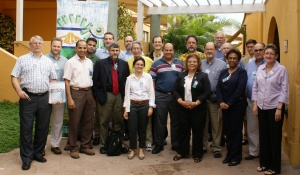Sep 7 2015
The University of Puerto Rico and University of Pennsylvania have been awarded a $3 million National Science Foundation grant to support their Partnership for Research and Education in Materials.
 PREM leaders at an annual symposium.
PREM leaders at an annual symposium.
The PREM award extends the decade-spanning relationship between UPR and Penn’s Laboratory for Research on the Structure of Matter, in which faculty, staff and students share resources and collaborate on interdisciplinary research related to materials science.
The PREM program is funded by the NSF’s Division of Materials Research with the aim of building long-term partnerships between minority-serving educational institutions and NSF research centers such as the LRSM, which hosts a Materials Research Science and Engineering Center.
Penn and UPR were two of the original institutions involved in this type of NSF partnership, which began more than 15 years ago when the program was known as a Collaborative to Integrate Research and Education. The most recent PREM award is the third garnered by UPR and the LRSM. This award supports the work of students and faculty at three UPR campuses: Humacao, Cayey and Bayamon, of which Humacao is the lead institution.
“We see this as a critical pathway for increasing diversity in STEM fields, both at Penn and beyond,” said Arjun Yodh, director of the LRSM and co-director of the PREM. “Moreover, all participating institutions are doing excellent science, and a long paper trail of collaborative interdisciplinary materials publications has resulted from our partnership.”
UPR, Humacao, is an undergraduate institution, and many of the joint papers published have undergraduate co-authors.
“The impact of PREM goes well beyond the program participants and has transformed the research culture at our university and influenced the Puerto Rican community at large,” said director Idalia Ramos, a professor in the Department of Physics and Electronics at UPR, Humacao.
“I think the success of our long partnership can be attributed primarily to the interest and commitment of partners from both institutions, who are always excited about working together on solving research problems as well as mentoring and motivating students,” she said. “After 15 years, we have well-established collaborations, but at the same time we continue evolving and innovating with new participants and new research directions.”
Biannual visits of Penn faculty to Puerto Rico and parallel extended summer visits of UPR faculty and students to Penn have helped to create an evolving research community. Notably, Penn chemistry professor Alan MacDiarmid’s first stop after winning the Nobel Prize in 2000 was UPR. His lecture on conducting polymers was the seed for a highly productive research program based on electrospinning technology, which is still ongoing at UPR. Subsequently, UPR set up its own electrospinning equipment to produce conducting polymer nanofibers and, more recently, inorganic nanofibers of gallium nitride and tin oxide.
Research conducted through the collaboration will focus on two nanotechnology-related topics: multi-functional nanodevices from optoelectronic materials and nanoscale interactions of macromolecules at soft and hard interfaces. The former deals with materials that can emit, detect and manipulate light and thus are potentially useful for sensing or energy storage. The latter explores nanoscale interactions of large molecules with soft and hard interfaces and offers potential applications in bioseparation, bioremediation and electronics.
In addition to Yodh, 10 Penn professors were co-investigators on the proposal and will directly participate in the 2015–20 PREM. Jay Kikkawa, A. T. Charlie Johnson and Eugene Mele from the School of Arts & Sciences’ Department of Physics and Astronomy; Ivan Dmochowski, Feng Gai and Gary Molander from its Department of Chemistry; and Ritesh Agarwal, Daeyeon Lee and Jorge Santiago from the School of Engineering and Applied Science. Christopher Murray, a Penn Integrates Knowledge professor with appointments in Chemistry and Engineering, is also part of the consortium.
Mohammed Islam and Preston Moore, former Penn postdoctoral researchers who collaborated with UPR researchers in previous years, will also participate from their current positions at Carnegie Mellon University and the University of the Sciences in Philadelphia.
They will collaborate with Ramos and 11 other professors across three campuses at UPR: Vibha Bansal, Rocío Cardona, Ezio Fasoli, Pablo Negrón, Margarita Ortiz, Rolando Oyola, Victor Pantojas, Nicholas Pinto, José O. Sotero, Josee Vedrine and Natalya Zimbovskaya.
LRSM associate director Andrew McGhie and assistant education director Mark Licurse, along with Ramón Rivera, education coordinator at UPR, Humacao, and Gilda Jiménez, a chemistry teacher at Petra Mercado High School, Humacao, will organize education and outreach aspects of the partnership, which include an annual symposium in May and an annual research meeting in November, both at UPR, and regular video lectures, as well as opportunities for high school students to get involved in UPR-based research through a program known as Experimenta con PREM.
Adding diversity to the early stages of the STEM pipeline is part of the PREM mission. Undergraduate students at UPR have gone on to continue their studies at Penn, either as visiting students, doctoral candidates or through the recently instituted Postdoctoral Fellowships for Academic Diversity at Penn. Newly appointed professor Rocío Cardona, UPR, Bayamon, was awarded the first of these postdoctoral fellowships.